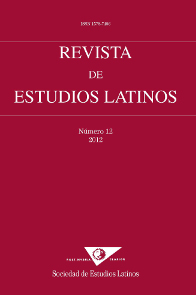Text as both trap and redemption: Regarding the chronology of Seneca’s treatise De breuitate uitae
DOI:
https://doi.org/10.23808/rel.v12i0.87790Keywords:
chronology; text omissions; meaning construction.Abstract
This paper argues that the traditional hypothesis used to establish the chronology of the treatise De breuitate uitae, consisting in deducing from 13, 8 Seneca’s ignorance of the urban reformation carried out by Claudius in 49 AD may be, at the very least, deceitful should the ultimate conclusions be reached from the fact that Seneca omitted this detail in this paragraph while alluding to Rome’s pomerium. Instead, this paper lends weight to the hypothesis of dating De breuitate uitae forward from common belief.
Downloads
Downloads
Published
How to Cite
Issue
Section
License
Copyright (c) 2012 Revista de Estudios Latinos

This work is licensed under a Creative Commons Attribution-NonCommercial-NoDerivatives 4.0 International License.
The originals published in the printed and electronic editions of this journal are the property of the Revista de Estudios Latinos and can be circulated as long as the original source and authorship is made clear in any reproduction, full or partial, of the same, and as long as this is not done for commercial purposes.






